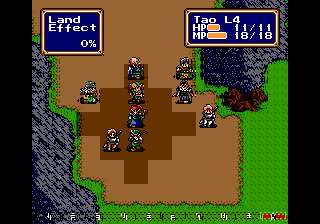

![]()
By zkman
Be original! |
Battles in RPG's are very often the most significant part of a role-playing game design, but because of the success of games like Final Fantasy 7 among Westerners, and the influence of Darkdread's games on qb coders, prosaic battle layouts are the rule of the day in qbasic. This often leads to a dull and monotonous play for your users. You don't want battles to be used simply as a way to earn money or give challenge to a short title, having players lull into a "click-through" or "push-through" state of battling where one merely chooses "Attack" again and again. But what other kind of battle systems are there to use in your games? And how can nonconformity to past titles make yours a "legend"? Read on... |
|
Types of battle engines The Strategy RPG generally relies on a few things: non-random battles, specific weaknesses/advantages, and large battlefields that allow a character to retreat as well as advance. Many strategic RPG's also employ a technique where every encounter is full-planned, and a long arrangement; something like only having 20 battles in a game, but having each last more than a half hour. The most important thing, though, is to remember that strategy RPG's have to allow a character to know the strengths and weaknesses of each type of enemy. For instance, a Ghoul can fire a magic spell at everyone within a radius of 2, but is weak against Water magic, or something similar. Also, formations should be allowed to gain an advantage. Remember, a strategy RPG means anything from allowing characters to fight on a simple grid-layout, to a full-fledged Warcraft in your RPG. Final-Fantasy style RPG's are the most common type with qbasic coders, simply because they are not very difficult to code. A final-fantasy RPG generally means groups of "good characters" on one side of the screen, and "enemies" on the other, with each attacking in turn. The only problem with this setup is that it's very easy to get into a "click, click, yawn, yawn" system unless you throw in some tricks. For instance, how about allowing your character to steal from the enemy, or give the character a "special" ability if they kill each difficult boss. Keep in mind that stagnance is easy to accomplish with such a system, but with legerdemain of the method, a legend will be made. The final "metasystem" is the Action RPG. This basically encompasses every RPG that has a different battle system than the two listed above, but is generally referring to Zelda-style gameplay. In such a system, there are no "turns"; basically, if you press the button, you swing your sword, if you click the mouse, you cast the spell. The enemies are almost-always on-screen in such a system, as well. But zelda-style is not the only flavour: games such as Samarai Showdown RPG allow you to fight your battles "Street-Fighter" sytle. With this system, you are free to let your mind run with an idea, but this generally accounts for the longest time spent programming, which is why you have seen it rarely in qb (Of Hell and Magic and Ziel being notable exceptions). |
Shining Force - a Strategy RPG |

|
|
Now that I have a general idea... Special abilities are very consequential to a player's enjoyment of an RPG. Not only do special abilities allow for additional eye-candy, they also allow the player to greater plan what they're going to do, and will test a player's patience (if they'll use a big ability now instead of later). Making special abilities, both for players and enemies, rare and important, will further the excitement over them, and also take humdrum gameplay away from your game, with players looking forward to something other than "attack". Special abilities also make good rewards for players at specific points; who can forget when they got each spell in Zelda 64? Items are also affected by the choices you make when creating your battle engine. For instance, in a Fantasy RPG, there's no point in creating multiple weapons that are basically the same gameplay wise. Your players will not see the point. Instead, make each item/weapon/defense significant, and, if possible, make each effective against a certain type of enemy, so that there is no "best"; some are good some of the time, others better at other times. Quality over Quantity When a player looks forward to your skirmishes, and attempts to seek out all the ways in which to gain a slight advantage, or even says "Yeah, this is cool", as they play it, you have accomplished a good battle system. Although a battle system is not nearly as important as a good plot or character development in an RPG title, when the player feels the battles are "getting in the way", they are not quite tweaked. Good luck!
|